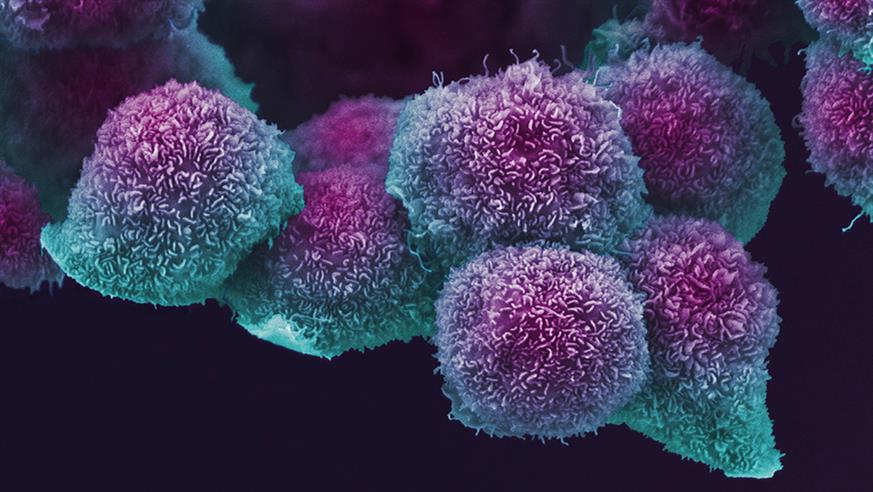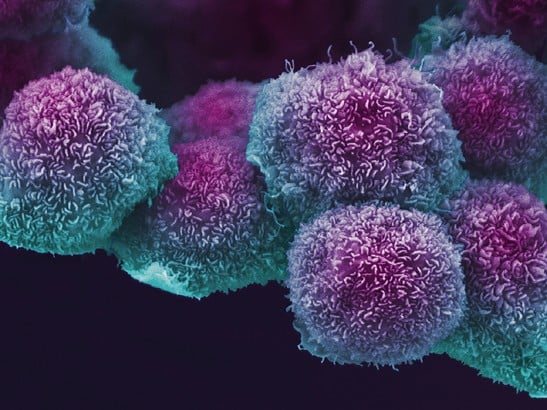
Image: Pancreatic cancer cells. Credit: Anne Weston, Francis Crick Institute
Cancer scientists and researchers from all over the world would normally gather to attend meetings and conferences, but things are now very different. The Covid-19 pandemic has put a stop to large-scale events as we used to know them, forcing many to take place online instead. Though it may have proved a drastic change at the start of the pandemic, these virtual events don’t seem as out of the ordinary as they once did.
The Annual Meeting of the American Association for Cancer Research (AACR) is no different. It was previously held in various locations across the US each year – the most recent being Atlanta, Georgia – before Covid-19 first prevented researchers from being able to present face-to-face in 2020. This will mark the second time that the AACR is hosting its annual meeting virtually.
Breakthroughs in the clinic
The event showcases the latest discoveries in cancer research and medicine, bringing together a global cohort of scientists from different institutions to present their findings and work. The meeting’s Program Committee is chaired by Professor Charles Swanton from the Francis Crick Institute, London.
The 2021 meeting will run over two separate weeks, with the first week taking place 10 – 15 April and the second 17 – 21 May. The theme for this year is Discovery Science Driving Clinical Breakthroughs – our partnership with The Royal Marsden NHS Foundation Trust makes this a topic on which researchers at The Institute of Cancer Research are well equipped and well placed to present.
Several aspects of research at the ICR will be presented at the meeting, such as the effect of new types of anticancer agents and uncovering different routes to established therapies to help individual patients.
Immune reactivation
One of the studies, led by Dr Anguraj Sadanandam at the ICR, working closely with colleagues at The Royal Marsden, involves the use of immune-activating agents as a potential therapy for aggressive forms of pancreatic ductal adenocarcinoma (PDAC), the most common type of pancreatic cancer. Such agents are able to modulate immune responses, providing an opportunity to utilise them in immunotherapy.
Using mouse models with distinct immune features, the team are exploring whether treating tumours with a molecule that activates a certain receptor is beneficial for survival and reduced tumour burden. Since the outcome depends on the specific composition of a patient’s immune system, this research is also important for establishing who could benefit most from this approach, and provide a way to offer personalised testing.
New anticancer agents
Another of the meeting’s poster presentations is centred on the first comprehensive single cell analysis of cancer-associated fibroblasts in PDAC, also led by Dr Sadanandam. Fibroblasts are cells that can play a critical role in cancer progression in pancreatic cancer, but little is known about how the fibroblast classifications differ from each other, as well as their importance in prognosis. By analysing PDAC in humans and mice, the study sheds light on these gaps and the other fibroblast subtypes that could prove useful in prognosis and disease management.
Combination therapies
Early clinical trial results will also be on the meeting agenda, such as for the combination of two cancer pathway inhibitors – VS-6766 and defactinib – on a KRAS mutated form of non-small-cell lung carcinoma, which is in phase I trials. Professor Udai Banerji at the ICR and The Royal Marsden is the chief investigator of this study and led earlier work suggesting the promising potential of the VS-6766 drug.
Professor Banerji will also be presenting a poster on a drug discovered at the ICR, called SRA737. The team are studying the effect of the drug on cancer cells when used in combination with another cancer drug, called adavosertib.
Our CEO, Professor Paul Workman, is a leading expert in cancer drug discovery and will be presenting on the role of combination therapies in overcoming cancer drug resistance during one of the major symposia and then take part in a companion panel discussion.
Meanwhile, Dr Juanita Lopez from The Royal Marsden and the ICR will present the results of a phase I trial led by the Investigator Initiated Trials team within the joint Drug Development Unit. The trial, called Ice-CAP, is investigating the combination of ipatasertib with atezolizumab for treating advanced solid tumours.
Cancer-killing viruses
Two posters on the potential of using engineered versions of herpes simplex virus (HSV) as a cancer therapy, led by Professor Kevin Harrington, will also be presented at the meeting. One will show how a novel HSV can be used to kill head and neck cancer and melanoma, while the other presents results from an ongoing clinical trial on the effect of HSV on solid tumours, either on its own or in combination with immunotherapy.
Follow the conference news
This is just some of the research coming up at this year’s AACR Annual Meeting. Keep up to date with the conference by following along on social media using the hashtag #AACR21.
